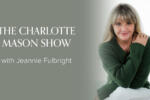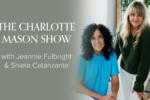CM 4: Audioblog- Julie Ross The Outdoor Life of Children
Show Transcript:
CM EP 4 Julie Ross
JULIE – Welcome to the Charlotte Mason show, a podcast dedicated to discussing Ms. Mason’s philosophy, principles and methods. It is our hope that each episode will leave you inspired and offer practical wisdom on how to provide this rich, living education in your modern homeschool.
So pull up a chair, we’re glad you’re here.
Today’s episode of the Charlotte Mason show is brought to you by Medi-Share. Find out more about this affordable Christian alternative to traditional health insurance at medishare.com.
Hello everyone, welcome back to the Charlotte Mason show. I’m your host, Julie Ross, and today I’m going to be reading from volume one of Charlotte Mason’s original homeschooling series, Home Education. And the title of this section of the book is The Outdoor Life for the Children, and I’m gonna be reading part 7, The Child Gets Knowledge by Means of His Senses.
Watch a child standing at a gaze at some sight new to him. A plow at work, for instance. And you will see he is as naturally occupied as is a babe at the breast. He is, in fact, taking in the intellectual food which the working faculty of his brain at this period requires. In his early years the child is all eyes. He observes, or more truly, he perceives, calling sight, touch, taste, smell, and hearing to his aid, that he may learn all that is discoverable by him about every new thing that comes under his notice.
Everybody knows how a baby fumbles over with soft little fingers and carries to his mouth and bangs that it may produce what sound there is in it. The spoon or the doll which supercilious grownup people give him to keep him quiet. The child is at his lessons and is learning all about it at a rate utterly surprising to the physiologist who considers how much is implied in the act of seeing. For instance, to the infant, as to the blind adult restored to sight, there is at first no difference between a flat picture and a solid body. That the ideas of form and solidity are not obtained by sight at all but are the judgments of experience.
Then think of the vague passes in the air the little fist makes before it lays hold of the object of desire and you see how he learns the whereabouts of things, having as yet no idea of direction. And why does he cry for the moon? Why does he crave equally a horse or a housefly as an appropriate plaything? Because far and near, large and small, are ideas he has yet to grasp. The child only has truly a great deal to do before he is in a condition to believe his own eyes. But nature teaches so gently, so gradually, so persistently, that he is never overdone but goes on gathering little stores of knowledge about whatever comes before him.
And this is the process the child should continue for the first few years of his life. Now is the storing time which should be spent in laying up images of things familiar. By and by he will have to conceive of things he has never seen. How can he do it except by comparison with things he has seen and knows?
By and by he will be called upon to reflect, understand, reason. What material will he have, unless he has a magazine of facts to go upon. The child who has been made to observe how high in the heavens the sun is at noon on a summer’s day. How low at noon on a day in mid-winter is able to conceive of the great heat of the tropics under a vertical sun. And to understand the climate of a place depends greatly upon the mean height the sun reaches above the horizon.
Overpressure. A great deal has been said lately about the danger of overpressure. Of requiring too much mental work from a child of tender years. The danger exists but lies, not in giving the child too much, but in giving him the wrong thing to do. The sort of work for which the present state of his mental development does not fit him. Who expects a boy in petticoats to lift half a hundredweight? But give the child work that nature intended for him and the quantity he can get through with ease is practically unlimited. Whoever saw a child tiring of seeing, of examining his own way, unfamiliar things? This is the sort of mental nourishment for which he has an unbounded appetite. Because it is that food of the mind on which, for the present, he is meant to grow.
Now, how far is this craving for natural sustenance met? In infant and kindergarten school by object lesson, which is good so far as it goes. But is sometimes like that bean a day on which the Frenchman fed his horse. The child at home has more new things brought under his notice, if with less method. Neither at home nor at school is much effort made to set before the child the abundant feast of eyes which his needs demand.
A child learns from things. We older people, partly because of our mature intellect, partly because of our defective education, get most of our knowledge through the medium of words. We set the child to learn in the same way and find him dull and slow. Why? Because it is only with a few words in common use that he associates a definite meaning. All the rest are no more to him than the vocables of a foreign tongue.
But set him face to face with a thing and he is twenty times as quick as you are in knowledge about it. Knowledge of things flies to the mind of the child as steel fillings to a magnet. And pari-passu (given equal footing) with his knowledge of things, his vocabulary grows. For it is a law of the mind that what we know, we struggle to express. This fact accounts for many of the apparently aimless questions of children. They are in quest, not of knowledge but of words to express the knowledge they have. Now consider what a capable waste of intellectual energy it is to shut up a child blessed with this inordinate capacity for seeing and knowing, within the four walls of a house or in the dreary streets of a town. Or suppose that he is let to run loose in the country where is plenty to see. It is nearly as bad to let this great faculty of the child’s dissipate itself in random observations for want of method and directions.
The sense of beauty comes from early contact with nature. There is no end to the store of common information, got in such a way that it will never be forgotten which an intelligent child may furnish himself before he begins his school career.
The boy who can tell you off hand where to find each of the half dozen most graceful birches, the three or four finest ash trees in the neighborhood of his home has chances in life a dozen to one compared with the slower lower intelligence that does not know an elm from an oak. Not merely chances of success but chances of a larger, happier life for it is curious how certain feelings are linked with the mere observation of nature and natural objects. The aesthetic sense of the beautiful, says Dr. Carpenter, of the sublime, of the harmonious, seems in its most elementary form to connect itself immediately with the perceptions which arise of out of the context of our minds with external nature. Why he quotes Dr. Morrell who says still more forcibly that all those who have shown a remarkable appreciation of form in beauty date their first impressions from a period lying far beyond the existence of definite ideas or verbal instruction.
Most grown men lose the habit of observation. Thus, we owe something to Mr. Evans for taking his little daughter Mary Anne with him on his long business drives among the pleasant Warwickshire lanes. The little girl stood up between her father’s knees, seeing much and saying little. And the outcome was the scenes of rural life in Adam Bead and the mill upon the floss. Wordsworth reared amongst the mountains became a very prophet of nature, while Tennyson draws endless imagery from the levels of eastern counties where he was brought up.
Little David Copperfield was a very observant child though, says he, I think the memory of most of us can go farther back into such times than many of us suppose. Just as I believe the power of observation in numbers of very young children to be quite wonderful for its closeness and accuracy. Indeed, I think that most grown men who are remarkable in this respect may with greater propriety be said not to have lost the faculty than to have acquired it. The rather, as I generally observe such men to retain a certain freshness, and gentleness, and capacity of being pleased which are also an inheritance they have preserved for their childhood. In which remark Dickens makes his hero talk sound philosophy as well as kindly sense.
Today’s episode is brought to you by A Gentle Feast. A Gentle Feast is a complete curriculum for grades one through twelve that is family centered and inspired by Ms. Mason’s programs and philosophy and rooted in books, beauty, and Biblical truth. You can find out how smooth and easy days are closer than you think at agentlefeast.com.
Part eight, the child should be made familiar with natural objects. An observant child should be put in the way of things worth observing. But what is the use of being a very observant child if you are not put in the way of things worth observing? And here is the difference between the streets of a town and the sights and sounds of the country. There is plenty to be seen in town and the children accustomed to the ways of the street become nimble witted enough. But the scraps of information to be picked up in a town are isolated fragments. They do not hang on to anything else nor come to anything more. The information may be convenient, but no one is the wiser for knowing on which side of the street is the Smith and which turning leads to Thompson’s shop.
Every natural object a member of a series. Now take up the natural object. It does not matter what. And you are studying one of a group, a member of a series. Whatever knowledge you get about it is so much more towards the science which includes all of its kind. Break off an elder twig in spring. You notice a ring of wood around a center of pith and there you have at a glance a distinguishing character of a great division of the vegetable world.
You pick up a pebble. Its edges are perfectly smooth and rounded. Why, you ask? It is weather worn, water worn. And that little pebble brings you face to face with disintegration, the force to which more than to any other we owe the aspects of the world which we call picturesque. Glenn, ravine, valley, hill. Is it not necessary that the child should be told anything about disintegration or ?? two-leafed, only that he should observe the wood a pith in the hazel twig. The pleasant roundness of the pebble. And by and by he will learn the bearing of the facts with which he is already familiar. A very different thing from learning the reason why of facts which have never come under his notice.
Power will pass more and more into the hands of the scientific men. It is infinitely well worth of the mother’s while to take some pains every day to secure, in the first place, that her children spend hours daily amongst rural and natural objects. And in the second place, to infuse into them, or rather to cherish in them, the love of investigation.
I say it deliberately, says Kingsley, as a student of society and of history. Power will pass more and more into the hands of scientific men. They will rule and they will act cautiously we may hope and modestly and charitably. Because in learning true knowledge they will have learned also their own ignorance. And the vastness, the complexity, the mystery of nature. But they will be able to rule. They will be able to act. Because they have taken the trouble to learn the facts and laws of nature.
Intimacy with nature makes for personal wellbeing. But to enable them to swim with the stream is the least of the benefits this early training should confer on the child. A love of nature, implanted so early that it will seem to them here after to have been born in them, will enrich their lives with pure interests absorbing pursuits, health, and good humor.
I have seen, says the same writer, the young man of fierce passions and uncontrollable daring expend healthily that energy which threatened daily to plunge him into recklessness, if not into sin, upon hunting out and collecting through rock and bog, snow and tempest, every bird and egg of the neighboring forest. I have seen the young London beauty, amid all the excitement and temptation of luxury and flattery with her heart pure and her mind occupied in a boudoir full of shells, fossils, flowers and seaweed, keeping herself unspotted from the world by considering the lilies of the field, how they grow.
All right, so let me bring up some points that were addressed in this passage from Home Education. So Charlotte Mason is talking about the importance of a child being out in nature from the time that they’re very little. She said even babies are learning the shape and the structure of objects by being out in nature and touching them. And she says they should never remember back to a time when nature was not part of their experience.
She’s saying that this early exposure to nature will give the child mental images that when they learn later scientific concepts like climate, longitude-latitude, those kinds of things, they have some understanding of, like, how the sun works. What it looks like at different times of the day from being outside in nature. So that’s going to help them with their later scientific learning.
She also talks about a concern for children being over pressured and she says you don’t have to worry about that when they’re young, when they’re spending a lot of time out in nature. Children will never grow tired of that time. That they have a natural curiosity and appetite for learning about the natural world.
She says that spending regular time out in nature develops a child’s sense of beauty. That it hones their power of observation. And that it will lead to personal wellbeing. She says you can determine the success of the man or woman based on the time that they spend in nature as a child. That it will determine the character of the adult. And she quotes Kingsley here and he’s talk about how boys can be kept out of temptation by using their energy to explore and have adventures outside, to have a nature collection and he also talks about a young woman whose mind and heart is kept pure because she is thinking about the lilies. She’s considering the shells.
And I am going to quote here, with a part that I’ve already read. I just wanna read it again because I really believe that it is so important. And it says, “It is infinitely well worth the mother’s while to take some pains every day to secure in the first place that her children spend hours daily amongst rural and natural objects. And in the second place, to infuse into them or rather to cherish in them the love of an investigation.”
So that’s just being outside like she talks in here about how it can also be detrimental if a child’s out in the country, but they’re just left to roam wherever and they’re not given a method or instruction at all. And so she talked in here about cherishing in them the love of investigation. That natural curiosity and appetite that children have to learn more about the world around them
So I hope that gives you some more insight into Charlotte Mason’s teaching on the importance of young children being out in nature, and will hopefully encourage you to go get outside.
Thank you for joining us today on the Charlotte Mason show. I’m your host, Julie Ross, and I would love to meet you in 2020. I will be at all seven Great Homeschool Conventions, speaking as part of their Charlotte Mason Track. Go to greathomeschoolconventions.com to find one near you.
If you want more information on what was shared in today’s podcast, go to homeschooling.mom for the show notes. Also, don’t forget to subscribe to this podcast in iTunes or Google Play so you never miss an episode.
Until next time.
A Special Thanks to our sponsors:






